Table of Contents
If you are a poodle owner, you may have noticed your furry friend experiencing eye problems. One of the most common issues that poodles face is eye infections. These infections can be caused by various factors, including allergies, bacteria, and viruses. It is important to recognize the signs of an eye infection in your poodle and seek treatment promptly to prevent the condition from worsening.
Some common symptoms of eye infections in poodles include redness, discharge, swelling, and excessive tearing. In some cases, your poodle may also experience discomfort or pain in their eye. If you notice any of these symptoms, it is important to take your poodle to the vet for a proper diagnosis and treatment plan. With proper care, most eye infections can be treated and resolved quickly, allowing your poodle to return to their happy and healthy self.
Key Takeaways
- Poodle eye infections are a common issue that can be caused by various factors.
- Recognizing the symptoms and seeking prompt treatment is important for your poodle’s health.
- With proper care, most eye infections can be treated and resolved quickly.
Understanding Poodle Eye Infections
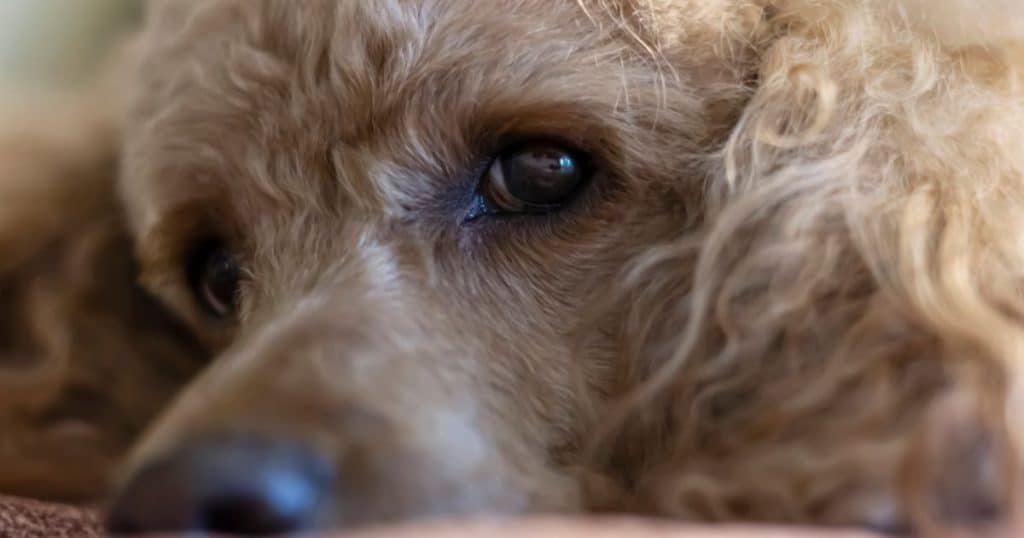
As a Poodle owner, it’s important to be aware of the potential for eye infections in your furry friend. Poodles are prone to various eye infections due to their facial anatomy, such as tear duct abnormalities, excessive hair growth around the eyes, and their susceptibility to dry eye syndrome.
One of the most common causes of eye infections in Poodles is the canine distemper virus. This virus can cause a range of clinical signs, including ocular discharge, redness, and swelling. Other causes of eye infections in Poodles include bacterial and fungal infections, foreign bodies, and trauma to the eye.
Clinical signs of an eye infection in your Poodle may include redness, swelling, discharge, tearing, and squinting. If you notice any of these symptoms, it’s important to seek veterinary care immediately. Delaying treatment can lead to complications and potentially permanent damage to your dog’s eyes.
Prevention is key when it comes to eye infections in Poodles. Regular grooming and cleaning around the eyes can help prevent the buildup of dirt and debris that can lead to infections. Additionally, keeping your Poodle’s eyes free of hair can help prevent irritation and infection.
Overall, it’s important to be aware of the potential for eye infections in your Poodle and to take preventative measures to keep your furry friend healthy and happy. By staying vigilant and seeking veterinary care at the first sign of an infection, you can help ensure that your Poodle’s eyes stay bright and healthy for years to come.
Common Symptoms of Eye Infections
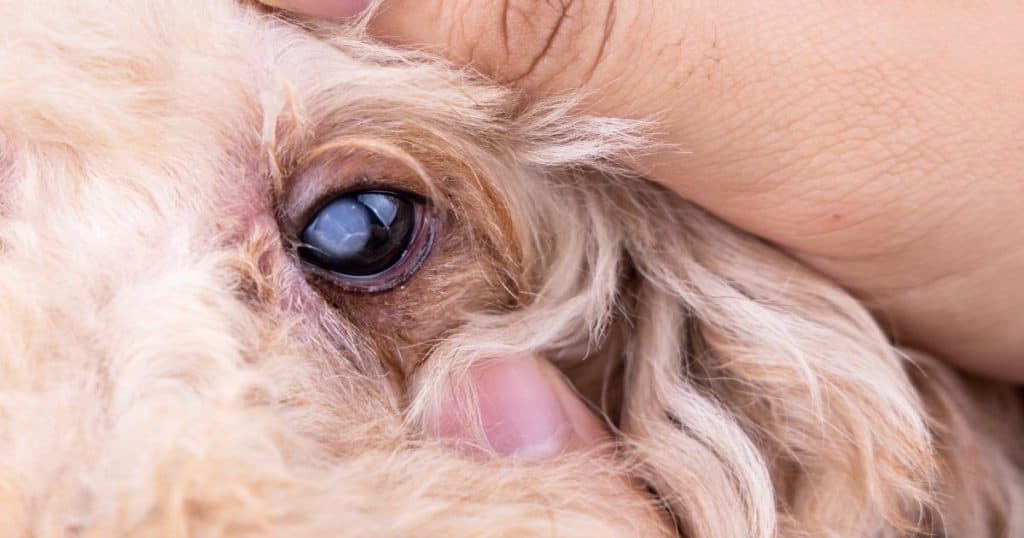
If you suspect that your poodle may have an eye infection, there are some common symptoms that you can look out for. These symptoms can range from visible discomfort to behavioral changes. Here are some of the most common symptoms of poodle eye infections:
Visible Discomfort
One of the most obvious signs of an eye infection in your poodle is visible discomfort. This can manifest in a number of ways, including redness, squinting, blinking, and watery eyes. Your poodle may also have eyelid abnormalities, such as swelling or changes in appearance. If you notice any of these symptoms, it’s important to seek veterinary attention as soon as possible.
Changes in Appearance
In addition to visible discomfort, eye infections can also cause changes in your poodle’s appearance. For example, you may notice that your poodle’s eyes look different than usual, or that there is a yellow or green discharge coming from their eyes. Your poodle’s vision may also be affected, and they may have difficulty seeing or be more sensitive to light than usual.
Behavioral Changes
Finally, eye infections can also cause behavioral changes in your poodle. For example, your poodle may become more irritable or lethargic, or they may paw at their eyes more frequently than usual. If you notice any of these symptoms, it’s important to seek veterinary attention as soon as possible.
Overall, if you suspect that your poodle may have an eye infection, it’s important to seek veterinary attention as soon as possible. By recognizing the common symptoms of poodle eye infections, you can help ensure that your furry friend gets the care they need to stay healthy and happy.
Causes of Eye Infections in Poodles
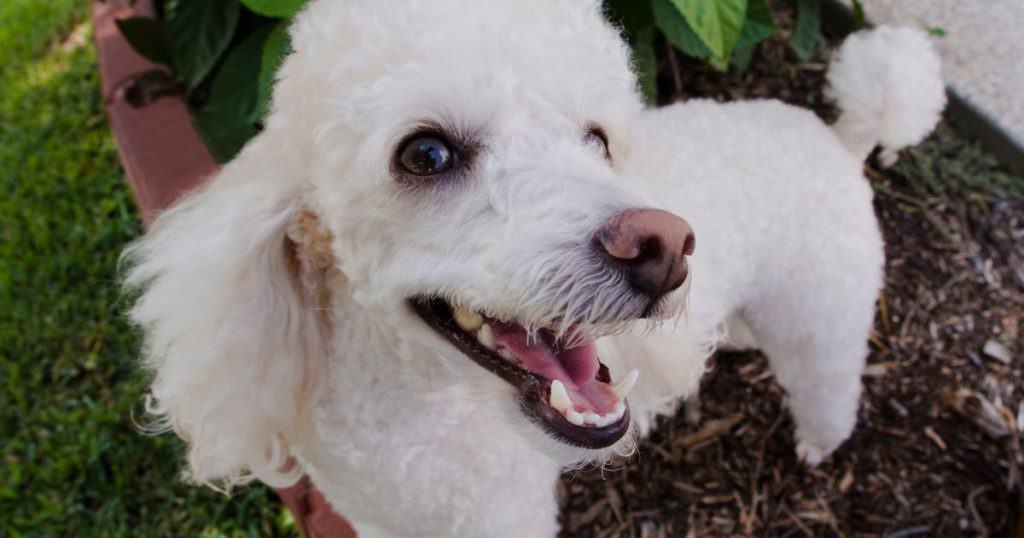
Poodles are prone to various eye infections due to their facial anatomy, such as tear duct abnormalities, excessive hair growth around the eyes, and their susceptibility to dry eye syndrome. Familiarizing yourself with these factors will help you identify potential issues early on.
Environmental Factors
Environmental factors can also play a role in causing eye infections in Poodles. Dust, pollen, and other allergens can irritate the eyes, leading to inflammation and infection. Dust mites are another common culprit that can cause eye infections in dogs.
Genetic Factors
Heredity can also play a role in causing eye infections in Poodles. Birth defects such as eyelid abnormalities or tear duct abnormalities can increase the risk of eye infections. If you have a Poodle with a history of eye infections or other eye problems, it is important to be vigilant and monitor their eye health closely.
Health Conditions
Certain health conditions can also increase the risk of eye infections in Poodles. For example, dogs with weakened immune systems are more susceptible to infections. Dogs with diabetes or other systemic diseases may also be more prone to eye infections. If you notice any unusual symptoms or changes in your Poodle’s eyes, it is important to seek veterinary care right away.
By understanding the causes of eye infections in Poodles, you can take steps to prevent them from occurring in the first place. Regular grooming, including trimming the hair around the eyes, can help reduce the risk of infection. Additionally, keeping your Poodle’s environment clean and free of allergens can help prevent eye infections. If you suspect that your Poodle has an eye infection, seek veterinary care right away to prevent the infection from spreading and causing further damage.
Types of Eye Infections
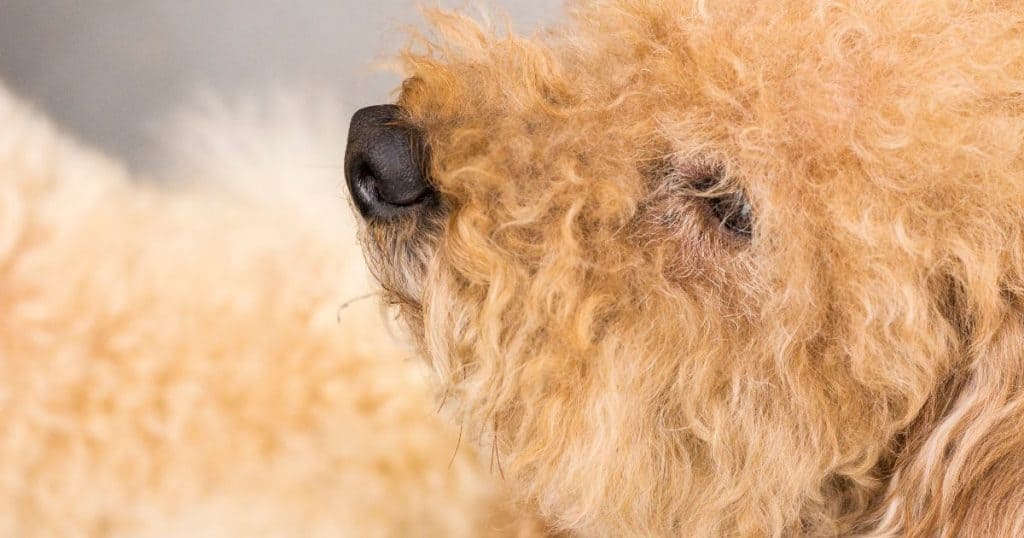
Poodles are prone to various eye infections, which can cause discomfort and pain. In this section, we will discuss the most common types of eye infections in Poodles.
Conjunctivitis
Conjunctivitis, also known as pink eye, is a common eye infection in Poodles. It is characterized by redness, swelling, discharge, and itching. Conjunctivitis can be caused by bacteria, viruses, allergies, or even foreign bodies that irritate the eyes. Treatment for conjunctivitis may include antibiotics, antiviral medication, or antihistamines.
Keratoconjunctivitis Sicca (KCS)
Keratoconjunctivitis sicca, also known as dry eye, is a condition where the eyes do not produce enough tears to keep them moist. This can lead to inflammation, scarring, and infection. KCS can be caused by immune-mediated diseases, certain medications, or nerve damage. Treatment for KCS may include artificial tears, cyclosporine eye drops, or surgery.
Glaucoma
Glaucoma is a condition where the pressure inside the eye increases, causing damage to the optic nerve. It can be acute or chronic and can lead to blindness if left untreated. Glaucoma can be caused by genetics, trauma, or other underlying eye conditions. Treatment for glaucoma may include eye drops, surgery, or medication.
Corneal Ulcers
Corneal ulcers are open sores on the surface of the eye. They can be caused by trauma, infection, or other underlying eye conditions. Corneal ulcers can cause pain, redness, and discharge. Treatment for corneal ulcers may include antibiotics, pain medication, or surgery.
In conclusion, Poodles are prone to various eye infections that can cause discomfort and pain. It is important to seek veterinary care if you suspect your Poodle has an eye infection. Treatment may include antibiotics, antiviral medication, or surgery depending on the type and severity of the infection.
Diagnosing Eye Infections
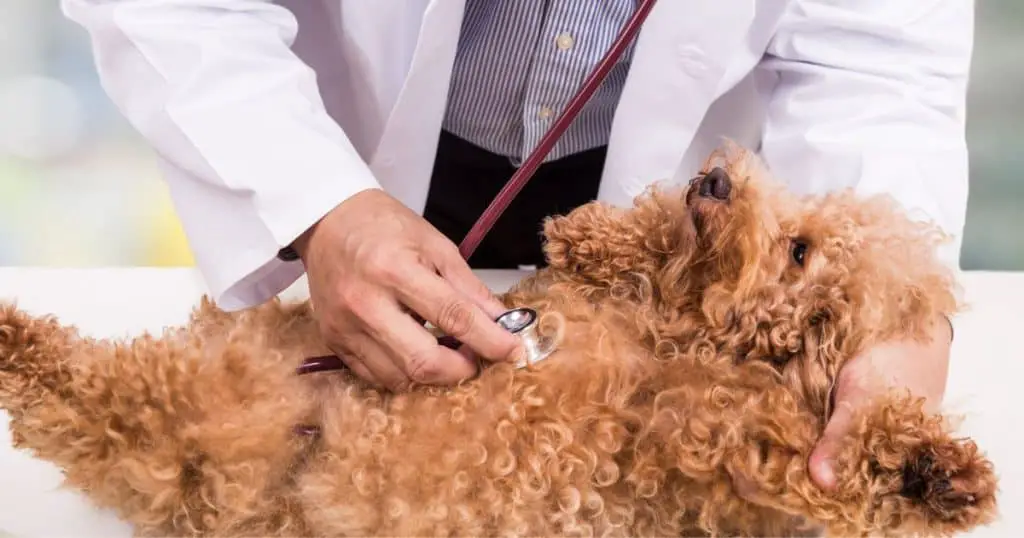
If you suspect that your Poodle has an eye infection, it is important to take them to a veterinarian for a proper diagnosis. A veterinarian will perform a series of tests to determine the cause of the infection and the best course of treatment.
Veterinary Examination
During a veterinary examination, the veterinarian will ask you about your dog’s symptoms and medical history. They will also perform a physical examination of your dog’s eyes, looking for signs of redness, swelling, discharge, or other abnormalities.
Schirmer Tear Test
One of the tests that a veterinarian may perform is the Schirmer Tear Test. This test measures the amount of tear production in your dog’s eyes. Low tear production can lead to dry eyes, which can increase the risk of eye infections.
Ophthalmic Examination
Another test that a veterinarian may perform is an ophthalmic examination. This examination allows the veterinarian to look at the internal structures of your dog’s eyes, including the lens, retina, and optic nerve. The veterinarian may also measure intraocular pressure to rule out glaucoma or uveitis.
It is important to note that some eye infections in Poodles may require further investigation to find the underlying cause. Therefore, it is crucial to take your Poodle to a veterinarian as soon as you notice any signs of an eye infection. With proper diagnosis and treatment, most eye infections in Poodles can be successfully treated.
Treatment Methods
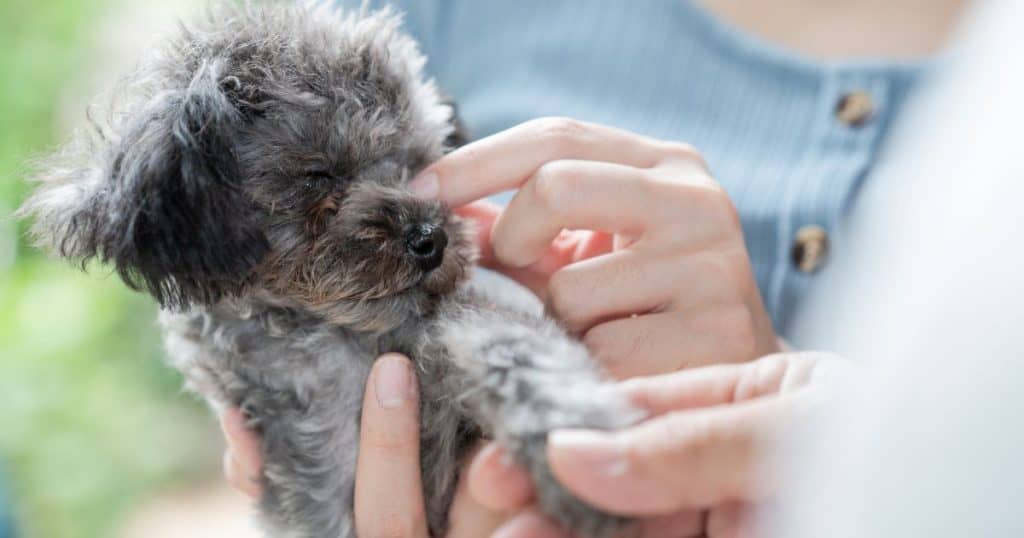
If your Poodle has an eye infection, there are several treatment options available to help them feel better. Treatment methods can be categorized into three main types: Medications, Surgical Interventions, and Home Care.
Medications
Medications are often the first line of defense against Poodle eye infections. Eye drops and ointments are commonly prescribed to treat bacterial infections, inflammation, and dry eye syndrome. Antibiotics are also used to treat bacterial infections, and topical antibiotics may be prescribed for more serious infections. Steroids are sometimes used to reduce inflammation, but they should only be used under the guidance of a veterinarian. Cyclosporine and tacrolimus are two other drugs that may be prescribed to treat dry eye syndrome.
Surgical Interventions
In some cases, surgery may be necessary to treat Poodle eye infections. Surgery may be required to remove foreign objects from the eye or to repair a tear in the cornea. In severe cases, surgery may be necessary to remove the eye altogether. Your veterinarian will be able to determine if surgery is necessary and will provide you with more information about the procedure.
Home Care
Home care is an important part of treating Poodle eye infections. Regular cleaning of the eyes can help prevent infections and reduce the severity of existing infections. Artificial tears can be used to help keep the eyes moist, and warm compresses can help reduce inflammation. It is important to follow your veterinarian’s instructions regarding home care, as improper care can lead to further complications.
In conclusion, Poodle eye infections can be treated with a combination of medications, surgical interventions, and home care. It is important to work closely with your veterinarian to determine the best course of treatment for your Poodle. With proper treatment and care, your Poodle can recover from an eye infection and return to their happy, healthy self.
Preventing Eye Infections
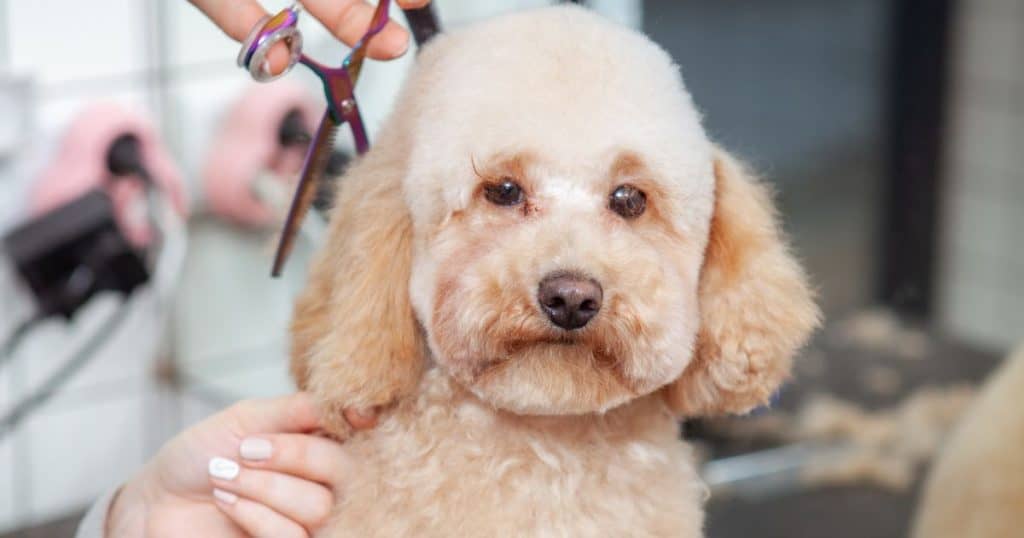
As a Poodle owner, it’s essential to take proactive measures to prevent eye infections from occurring. By following these simple steps, you can help ensure that your furry friend’s eyes remain healthy and infection-free.
Regular Eye Care
One of the easiest ways to prevent eye infections in Poodles is to practice good eye hygiene. This means cleaning your dog’s eyes regularly to remove any dirt, dust, or debris that may have accumulated. You can use a damp cloth or a special dog eye wipe to gently clean around the eyes.
Another crucial aspect of regular eye care is to keep your Poodle’s eyes moist. Dry eyes can lead to irritation and infection, so it’s important to use eye drops or a lubricating gel if your dog has a tendency to develop dry eyes. Your vet can recommend the best eye drops or gels for your Poodle’s specific needs.
Environmental Control
Poodles are susceptible to eye infections due to their facial anatomy, such as tear duct abnormalities, excessive hair growth around the eyes, and their susceptibility to dry eye syndrome. Therefore, it’s crucial to control your Poodle’s environment to minimize the risk of infection.
For instance, avoid exposing your Poodle to excessive dust, smoke, or other irritants that can cause eye irritation. Additionally, keep your Poodle’s hair around the eyes trimmed to prevent it from rubbing against the eyes and causing irritation.
Proper Grooming
Proper grooming is another essential step in preventing eye infections in Poodles. Regular grooming can help keep your dog’s coat clean and free of debris, reducing the risk of eye irritation and infection.
When grooming your Poodle, pay special attention to the hair around the eyes. Keep it trimmed and neat to prevent it from rubbing against the eyes and causing irritation. Additionally, be sure to brush your Poodle’s coat regularly to remove any mats or tangles that can trap dirt and debris.
In conclusion, preventing eye infections in Poodles requires a combination of regular eye care, environmental control, and proper grooming. By following these simple steps, you can help keep your furry friend’s eyes healthy and infection-free.
FAQs
What are the common symptoms of a poodle eye infection?
If your poodle is experiencing an eye infection, some common symptoms you may notice include excessive tearing, redness, swelling, discharge, and squinting. Your poodle may also rub their eye or paw at it frequently. If you notice any of these symptoms, it’s essential to take your poodle to the vet for a proper diagnosis.
How can I treat my poodle’s eye infection at home?
While it’s essential to take your poodle to the vet for a proper diagnosis, there are some things you can do at home to help alleviate their discomfort. You can clean your poodle’s eye with a warm, damp cloth to remove any discharge or debris. You can also use a saline solution to flush out their eye. However, it’s crucial to avoid using any over-the-counter eye drops without consulting your vet first.
Are there any over-the-counter eye drops for poodle eye infections?
It’s crucial to avoid using any over-the-counter eye drops without consulting your vet first. Some eye drops can make the infection worse or cause other problems. Your vet will be able to recommend the best course of treatment for your poodle’s specific condition.
What causes eye infections in poodles?
Eye infections in poodles can be caused by a variety of factors, including allergies, bacterial or viral infections, foreign objects in the eye, or underlying health conditions. It’s essential to take your poodle to the vet for a proper diagnosis to determine the underlying cause of their eye infection.
Can poodle eye infections be contagious to humans?
While some eye infections in dogs can be contagious to humans, poodle eye infections are generally not contagious. However, it’s still essential to practice good hygiene when caring for your poodle to avoid the spread of any potential infection.
When should I take my poodle to the vet for an eye infection?
If you notice any symptoms of an eye infection in your poodle, such as excessive tearing, redness, swelling, discharge, or squinting, it’s essential to take them to the vet for a proper diagnosis. Your vet will be able to determine the underlying cause of the infection and recommend the best course of treatment for your poodle’s specific condition.




Leave a Reply
You must be logged in to post a comment.